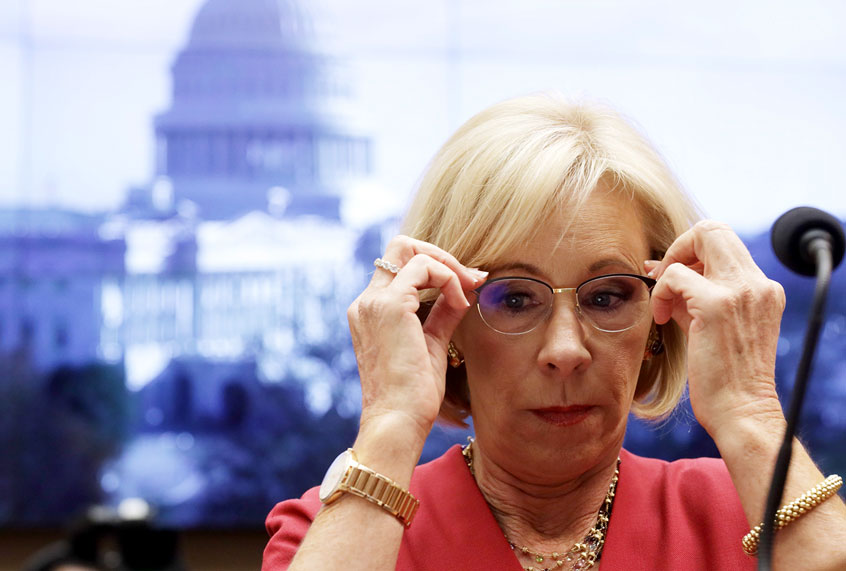After months of confusion and contradictory instructions, Secretary of Education Betsy DeVos on Thursday evening released an interim final rule that officially bars millions of students, hundreds of thousands of whom are undocumented, from accessing federal emergency funds under the Coronavirus Aid, Relief and Economic Security (CARES) Act.
The rule gives the force of law to guidance issued by DeVos in April, which limited access to the Act’s $6 billion in emergency student relief to students eligible for federal financial aid (FAFSA).
That effectively cuts out an approximate 450,000 undocumented students, including more than 200,000 “Dreamers” granted protected status under the Deferred Action for Childhood Arrivals (DACA) program. It may also impact up to 8 million other students who have not applied for federal money or may be otherwise ineligible, including students with poor grades, students with minor drug convictions and many student veterans.
“U.S. taxpayers have long supported U.S. students pursuing higher education, and this rule simply ensures the continuity of that well-established policy,” DeVos said in a Thursday statement. “Today’s action helps erase any uncertainty some institutions have expressed and helps make sure we can support America’s students facing the greatest needs.”
The National Education Association said in April that the guidance demonstrated an “astounding” level of “cruelty.” It was one again rebuked on Thursday.
“We’re not surprised by the department’s decision, but we are nonetheless disappointed that they chose not to make eight million students immediately eligible for these grants, especially given that the original authorizing statutes do not make that distinction,” Danial Madzelan, the assistant vice president for government and public affairs at the American Council on Education, told Salon.
“It’s shameful the Education Department is exhausting every avenue in pursuit of the administration’s xenophobic policy agenda — all during a pandemic,” Kyle Southern, the policy and advocacy director for higher education and workforce at the student advocacy group Young Invincibles, said in an emailed statement. “The courts should rebuke this effort based on a plain reading of the law,” he added.
The rule comes as the department defends two separate lawsuits about the guidance brought by California and Washington state, and an unfavorable judgment in either case could torpedo it.
Indeed, the department appeared to irk one federal judge this week after it changed its mind about issuing the rule two times in one day, walking back its walkback of a walkback.
In a virtual hearing in San Francisco district court, Judge Gonzalez Rogers accused the department of “putting roadblocks” between students and the emergency funds.
“How is that approach and tactic consistent with the word ’emergency’?” Rogers asked attorneys for the government. “It seems to me like you’re putting roadblocks to the distribution of this money.”
Indeed, DeVos has faced unrelenting criticism from higher education officials and Democratic lawmakers about how her department has administered the CARES Act. Those critics point to a pattern of mismanagement and miscommunication, one which injected unnecessary confusion into how schools administered an already complicated emergency program from the jump.
“When the CARES Act first went into place, the Education Department said that all students are eligible but not all expenses are,” Madzelan explained. “Students only needed to demonstrate real financial need to qualify.”
“But that changed over time, and now, here we are, two months later, not just with guidance but with a rule,” Madzelan said. “So yes, it has been confusing.”
This analysis is shared by the nonpartisan Congressional Research Service, which published a report in May which found that “the Secretary’s interpretation is not a particularly persuasive reading of the statute.”
Congress has the power to amend the CARES Act and block DeVos from imposing such restrictions. Though partisan gridlock has incapacitated most legislative work, DeVos’ ideology is rigid and severe enough that key Republicans have distanced themselves from her plans for the CARES Act, including Sen. Lamar Alexander of Tennessee, who chairs the committee which handles education policy.
“My sense was that the money should have been distributed in the same way we distribute Title I money,” Alexander told reporters last month, in a break with the secretary’s vision to fence some public funds over to private schools. “I think that’s what most of Congress was expecting.”
In the end, the new rule might be meaningless. It is still unclear how many schools have already distributed their emergency money to students, in which case they cannot wind back the clock in order to reallocate funds to Dreamers in need — or claw funds back from those who received any aid.
Madzelan, who served from 2009-2010 as acting assistant secretary for postsecondary education, says that government rules require agencies to set up reporting systems so outside spending can be tracked.
“There’s a reporting requirement, but we haven’t seen the mechanisms for it kick in yet,” he said. “Far as I’m aware, no one knows for sure how much of the relief money has been spent.”

